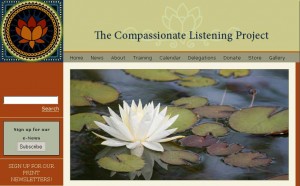 “Listening creates a holy silence. When you listen generously to people, they can hear truth in themselves, often for the first time. And in the silence of listening, you can know yourself in everyone. Eventually, you may be able to hear, in everyone and beyond everyone, the unseen singing softly to itself and to you.”
“Listening creates a holy silence. When you listen generously to people, they can hear truth in themselves, often for the first time. And in the silence of listening, you can know yourself in everyone. Eventually, you may be able to hear, in everyone and beyond everyone, the unseen singing softly to itself and to you.”
~ Rachel Naomi Remen, MD
Have you ever tried to listen to someone intently for three minutes without interrupting and interjecting, without letting your attention be diluted by questions and observations popping up in your head? It sounds simple, but not easy. This was one of the exercises we did at a workshop entitled “Compassionate Listening: Powerful Practices for Healing & Transformation” presented by Susan Partnow and Ilene Stark of The Compassionate Listening Project.
I wrote in my earlier post about seven common barriers to active listening. The inner workings of the brain may hinder our listening capacity.
First, the brain is a prediction machine. In a conversation, it is always in a rush to figure out what comes next, causing us to jump to conclusions and complete other people’s thoughts.
Second, the brain has a limited attention span and working memory capacity. Our prefrontal cortex, the brain region implicated in planning complex cognitive tasks, decision making, and moderating correct social behavior, is easily overwhelmed. We can process just about seven pieces of information in our conscious mind at any given moment. It makes it impossible to attend to several things simultaneously that require our concentration. It’s not easy to pay focused attention to the other person’s words.
In addition, the brain has a negativity bias. For our own survival and protection, the brain is wired to constantly scan the environment for threats and things that may go wrong. At the sign of a perceived threat, the amygdala triggers the “fight or flight” mode. As a result, our mind “freezes,” and we either launch verbal attacks or withdraw from the dialogue. Strong feelings and emotions affect our listening, reasoning and judgment.
Finally, the brain is good at conserving mental energy and resources. It filters out information that doesn’t comport with our own beliefs. Once we’ve made a decision, the brain is happy to look for evidence that supports our decision, conveniently ignoring contradictory information. In other words, we hear what we want to hear.
The goals of the compassionate listening workshop was to help the listeners and speakers overcome “defensiveness and reactivity” and connect heart to heart. There is a lot that goes into the practice of compassionate listening. Anchoring yourself in the heart rather then the head is not always easy. Among other things, compassionate listening means:
- being present;
- “accepting, but not necessarily agreeing”;
- looking for the common ground;
- valuing opposing views;
- seeking the good in conflict;
- practicing forgiveness;
- respecting yourself and others;
- staying centered even when the emotions become intense;
- being self-aware;
- suspending assumptions and judgment;
- being comfortable with uncertainty, ambiguity, and complexity;
- resisting the urge to offer opinions, advice, interpretations unless asked;
- trusting each person’s capacity to solve their own problems.
For more information on the practice of compassionate listening, visit The Compassionate Listening Project.
Related posts:

From my perspective, this post is a good summation of what it takes to truely listen. One obstacle that I sometimes encounter in attempts at dialogue is resentment that I am opening to the other persons views in a dialogic manner while they remain fixated in a more combative stance. In any case, I like your post.